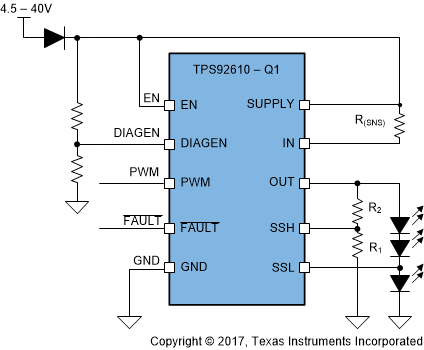SLDS233B October 2017 – January 2020 TPS92610-Q1
PRODUCTION DATA.
- 1 Features
- 2 Applications
- 3 Description
- 4 Revision History
- 5 Pin Configuration and Functions
- 6 Specifications
- 7 Detailed Description
- 8 Application and Implementation
- 9 Layout
- 10Device and Documentation Support
- 11Mechanical, Packaging, and Orderable Information
Package Options
Mechanical Data (Package|Pins)
- PWP|14
Thermal pad, mechanical data (Package|Pins)
- PWP|14
Orderable Information
3 Description
With LEDs being widely used in automotive applications, simple LED drivers are more and more popular. Compared to discrete solutions, a low-cost monolithic solution lowers system level component counts and significantly improves current accuracy and reliability.
The TPS92610-Q1 device is a simple single-channel high-side LED driver operating from an automotive car battery. It is a simple and elegant solution to deliver constant current for a single LED string with full LED diagnostics. Its one-fails–all-fail feature is able to work together with other LED drivers, such as the TPS9261x-Q1, TPS9263x-Q1, and TPS9283x-Q1 devices, to address different requirements.
Device Information(1)
| PART NUMBER | PACKAGE | BODY SIZE (NOM) |
|---|---|---|
| TPS92610-Q1 | HTSSOP (14) | 5 mm × 4.4 mm |
- For all available packages, see the orderable addendum at the end of the data sheet.
Typical Application Diagram
